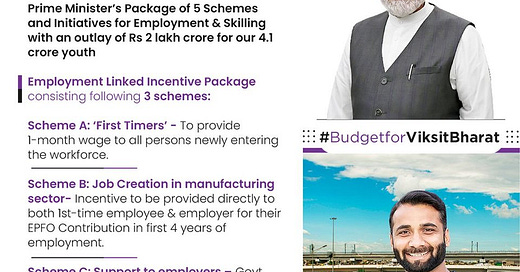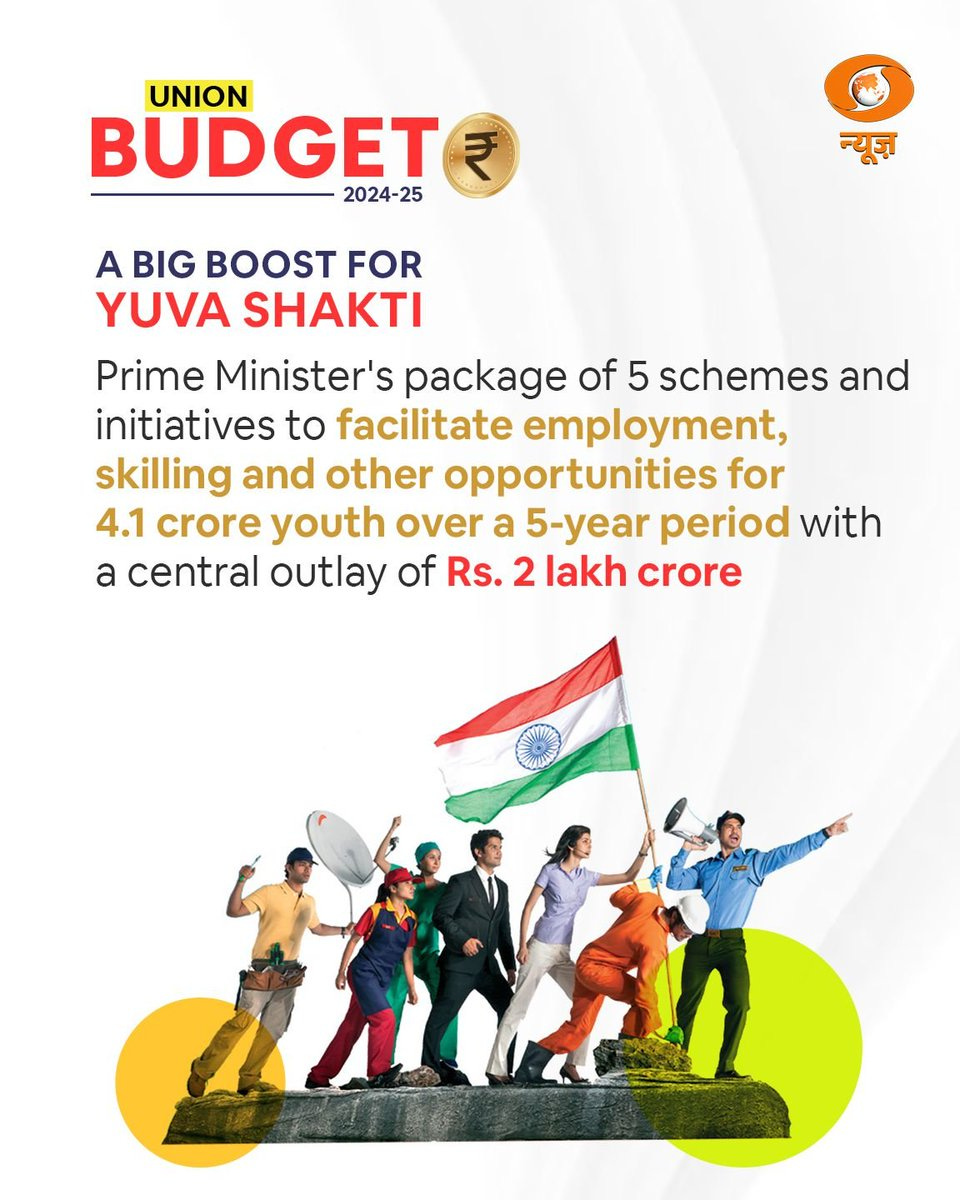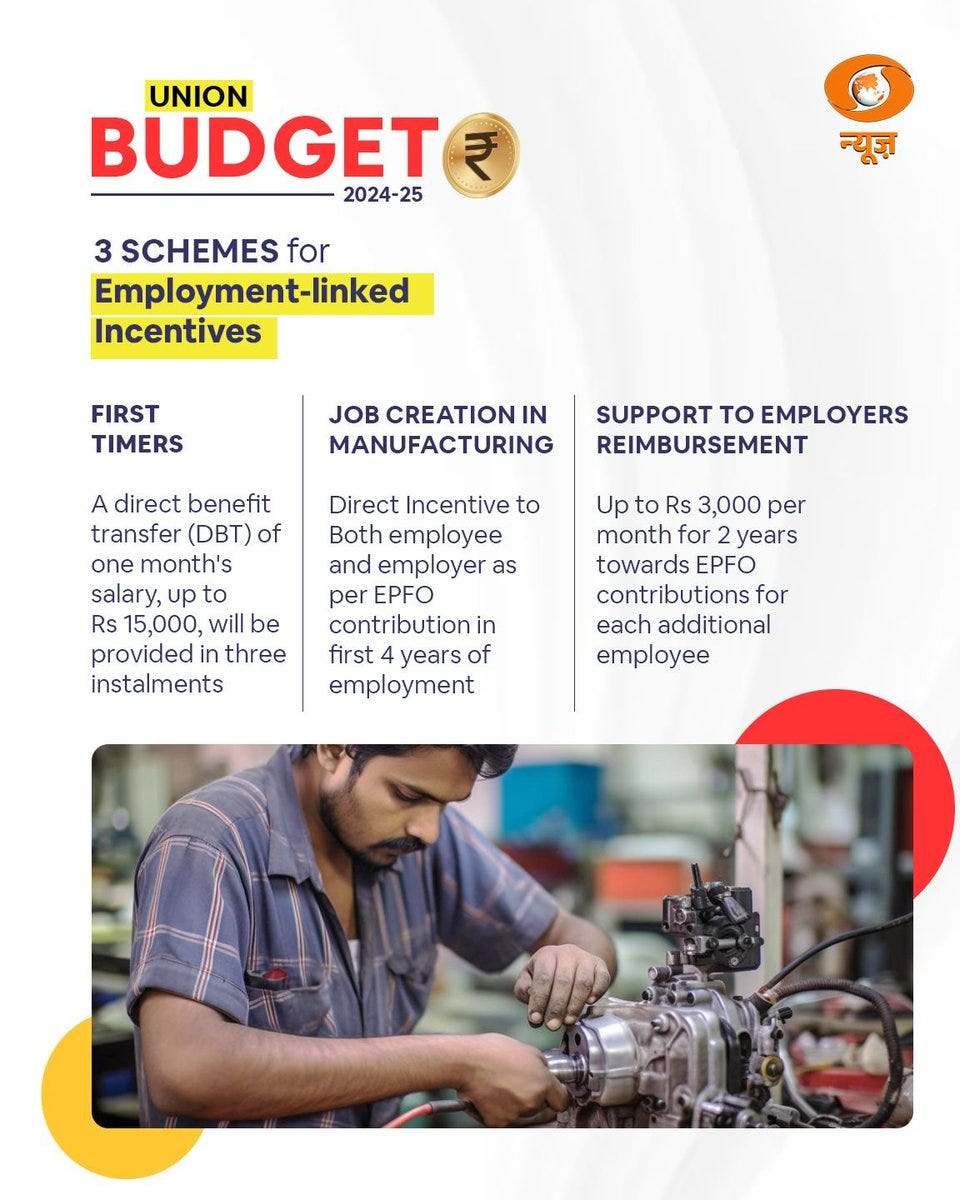Prime Minister’s Package for Employment and Skilling: A Welcome Initiative
Part 4 in our series, post-Budget. A comprehensive ₹2 lakh crore Prime Minister’s package aimed at addressing the aspirations of youth, particularly those seeking jobs or embarking on enterprises.
Prime Minister’s Package for Employment and Skilling: A Detailed Overview
The Budget 2024-25 unveils a comprehensive ₹2 lakh crore Prime Minister’s package aimed at addressing the aspirations of the youth, particularly those seeking jobs or embarking on entrepreneurial ventures. This initiative is a crucial part of the Modi Government’s strategy to tackle surging unemployment and mitigate the frustration caused by recent scandals, such as the UGC-NET and NTA-NEET examination leaks and the misuse of fake disability certificates in the UPSC Civil Services exam. Envisaged to benefit over 4 crore youth over its full duration, this ambitious plan, as outlined in the Finance Minister's speech, encompasses several schemes designed to incentivise employment, support skilling initiatives, and upgrade industrial training infrastructure.
Coverage and Estimated Central Outlay
The following table provides an overview of the estimated central outlay, enrolment, and duration of various schemes under the Prime Minister's Package for Employment and Skilling:
Outline of Schemes
Employment Linked Incentive Scheme A: First Timers
Subsidy: One month’s wage as subsidy (maximum `15,000) for first-time employees.
Eligibility: Applicable to all sectors for persons newly entering the workforce with a salary less than `1 lakh per month.
Incentive Structure: Subsidy paid in three instalments, with compulsory online Financial Literacy course before the second instalment.
Duration: 2 years.
Coverage: Expected to cover approximately one crore persons per annum.
Employer Obligation: Subsidy refunded if employment ends within 12 months of recruitment.
Employment Linked Incentive Scheme B: Job Creation in Manufacturing
Eligibility: Applicable for substantial hiring in manufacturing sector by employers with a three-year EPFO contribution track record.
Hiring Threshold: At least 50 previously non-EPFO enrolled workers or 25% of the previous year's EPFO employees.
Incentive Structure:
Year 1: 24%
Year 2: 24%
Year 3: 16%
Year 4: 8%
Shared equally between employer and employee.
Duration: 2 years.
Employer Obligation: Maintain enhanced employment levels; subsidy refunded if employment ends within 12 months.
Employment Linked Incentive Scheme C: Support to Employers
Eligibility: Employers who increase employment above the baseline and sustain the higher level.
Incentive: Government reimburses EPFO employer contribution up to `3,000/month for additional employees.
Duration: 2 years, with subsidy continuing for the third and fourth years for employers creating over 1000 jobs.
Skilling Programme and Upgradation of Industrial Training Institutes (ITIs)
Scope: Upgradation of 1000 ITIs in hub and spoke arrangements over five years.
Funding:
Government of India: `30,000 crore
State Governments: `20,000 crore
Industry: `10,000 crore (including CSR funding)
Focus: Outcome and quality of skilling, aligned to industry needs.
Expected Beneficiaries: 20 lakh students.
Internship in Top Companies
Objective: Skill one crore youth by India’s top companies over five years.
Duration: 12 months Prime Minister’s Internship with a monthly allowance of `5,000.
Eligibility: Youth aged 21-24 not employed or engaged in full-time education.
Cost Sharing:
Government:
54,000 towards monthly allowance (plus6,000 grant for incidentals).Company: `6,000 from CSR funds towards monthly allowance and training costs.
Application Process: Online portal with company selection based on shortlisting.
In Summary
The Prime Minister’s Package for Employment and Skilling is a substantial initiative aimed at bridging the gap between education and employment, enhancing job creation, and improving the skill levels of the Indian workforce. By addressing various aspects of employment and skilling through targeted schemes, the government aims to create a robust framework that not only supports current job seekers but also lays the foundation for future growth and development. The successful implementation of these schemes will be crucial in realizing the aspirations of millions of Indian youth.
However, the requirement for states to make a substantial financial contribution poses a significant challenge, as many states are experiencing fiscal stress, if not distress, following the end of the GST compensation scheme in June this year. Hopefully, the Central Finance Commission will be able to earmark sufficient funds to finance this scheme, which is critical to addressing the aspirations of the Indian youth.







